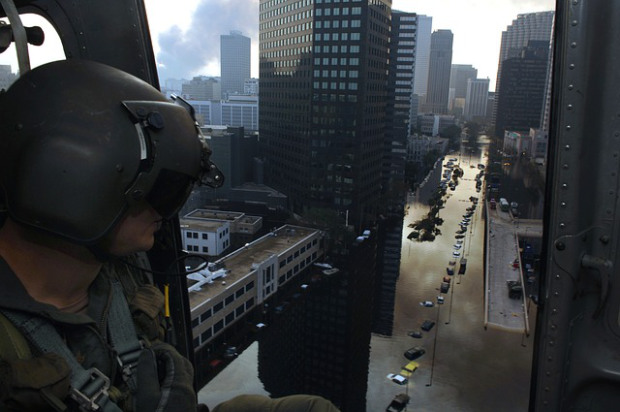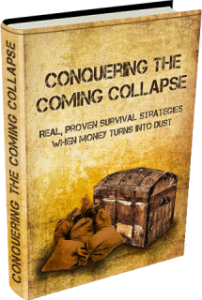Prepping is more than warehousing freeze-dried food and ammunition for the onslaught of the zombie apocalypse. As a prepper, I’ve accumulated some insight along the way and I’ve realized it’s a way of seeing life with an eye towards one’s future security and incorporating that insight into everyday exploits.
With a few keystrokes a person can bring up enough articles concerning prepping to make their head spin. While this can bring about a patent amount of information overload, information really is the first key item any prepper should have in abundance, and as you read this my hopes are that it can help guide you along your way.
Anyone with enough time and money can acquire all the ubiquitous objects touted as “must haves” in the numerous online prepping journals, blogs, magazines, etc. However if they don’t know how to use these items, all the M16’s, snare wire, and medical instruments in the world won’t do them any good. A good way to start prepping is to understand what it is, and anyone you ask who identifies as such will have a unique perspective on the question. Not understanding what prepping means to the individual and how it applies to everyday living can lead the unaware prepper in an unintended direction.
Rethinking my Prepper status
I’m fortunate enough to enjoy a comfortable income, so when I decided to start prepping I bought a couple thousand dollars in long-term storage freeze-dried foods, stocked up on ammo for my guns, made a huge bug-out-bag and bought a few water filters, then called it a day. I thought to myself, “Well, now I’m a prepper”. But was I? A recent crisis caused me to reevaluate my “prepper” status.
We had a family emergency which required me to take my wife to the hospital, but there was a problem. I didn’t know where the nearest emergency room was! I’ve lived here in our apartment for four years, and have never needed to go to a hospital emergency room. I’m ashamed to even admit this, as a 23-year, retired military veteran I failed to know my surroundings. Fortunately the issue with my wife was minor. I found the emergency room using my smart phone; however I should have known in advance where it was. The information of the emergency room location was free, and possibly lifesaving…which is a prime function of prepping.
It would have cost me nothing to find its location in advance, so I consider myself lucky, this time. This made me realize that “prepping” is the word given to any measures taken to ensure one’s safety, survival, and security, or the three S’s as I’ve come to coin them. I’ve distilled this from the Army’s old adage of the six P’s, Prior Planning Prevents Piss Poor Performance. Both have their place.
Keep it simple
Much of prepping is really basic ideas. Are your vaccinations up to date, do you know where the hospital, veterinarian, or local emergency shelters are located? Have you had your teeth checked in the last year? Simple ideas one may not think of, such as filling water bottles and stashing them in your freezer. This not only helps your freezer work more efficiently by not having to cool empty space, the frozen water will prolong the freezer’s low temperature during a power outage, and provide you with drinking water once they melt.
Have you ever ordered Chinese food? You know how you end up letting the obligatory two quarts of white rice turn into concrete in your refrigerator? Try dehydrating it instead and storing in zip-lock bags for use later in soups, chili or stews. Same with vegetables or fruit, dehydrate them before they turn. Do you know where the closest source of natural or stored water is located in case city water becomes contaminated? Consider alternate sources for water such as your home’s water heater, toilet tanks, or even a nearby swimming pool.
These suggestions presume you have water filters on hand. And if the idea of drinking filtered pool or toilet tank water makes you a bit queasy, consider the fact that the International Space Station astronauts drink their own recycled urine. Have you considered buying a small Uninterruptible Power Supply (UPS) for your wireless router so that you can still access the Internet on a tablet or smart phone during a power outage? For very little money you can hop on any online retail store and buy emergency lights that you can plug into your wall outlets that will automatically come on during a power failure, and some can be used as lanterns or hand-held flashlights.
Other things to consider that are low-cost and very helpful are to make copies of your family’s critical documents. I’ve scanned all of our documents and password protected them then stored them on two separate thumb drives. One thumb drive is in my BOB, and the other is in my wife’s BOB. The physical documents themselves are in water proof bags inside a portable safe, ready to take at a moment’s notice.
The need to be prepared isn’t theory
The likelihood of total societal collapse to me is unlikely, however having volunteered with the Army to help with the aftermath of hurricane Katrina in 2005, I’ve come to realize this type of condition is more likely to occur and is a very real threat. In a situation like hurricane Katrina one should seriously consider bugging the hell out, but for the people whom I saw choosing to stay, or not able to leave, they were obviously unprepared and utterly dependent on us and other government agencies for their safety, security, and survival.
I witnessed people fighting at a gas station trying to jockey in line for limited fuel. I wondered to myself why they hadn’t filled their cars, and anything else they could get their hands on, prior to the storm. After all, they knew it was coming. For this very reason, I keep my vehicle’s fuel tanks as full as possible at all times, and because I live in an apartment having no safe area to store fuel, I keep two empty five gallon fuel cans to be filled if necessary.
I know this short essay doesn’t cover all the possible approaches of preparing for the unexpected, but it’s not meant to. The idea I’m hoping you come away with is to take some time and think about what safety, security, and survival means to you and your family. Think about situations that you wouldn’t want to find yourself in and work on ways to prevent ending up there. More often than not you’ll find that employing the six P’s will help you find your three S’s.
If you found this article useful, please Vote for The Prepper Journal as a top prepper web site.
Copyright Information This information has been made available by The Prepper Journal. Content on this site (unless the work of a third-party) may be shared freely in digital form, in part or whole, for non-commercial use with a link back to this site crediting the author. All links in articles must remain intact as originally posted in order to be republished. If you would like to be notified of new articles, contests and Prepper news, please sign up for our daily newsletter.







